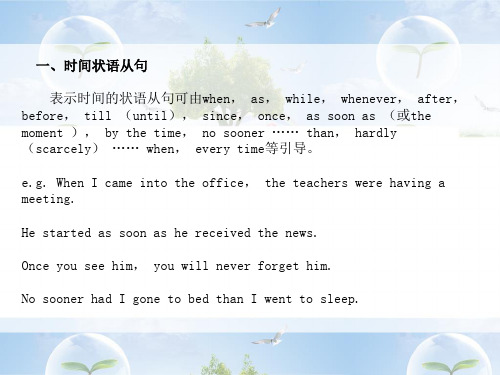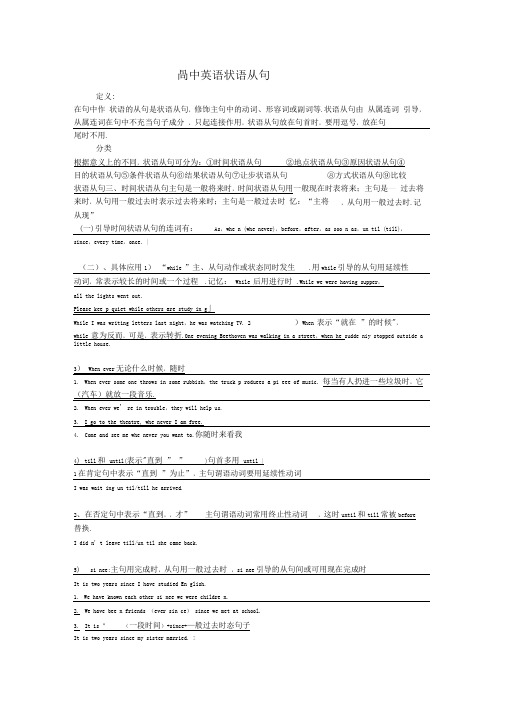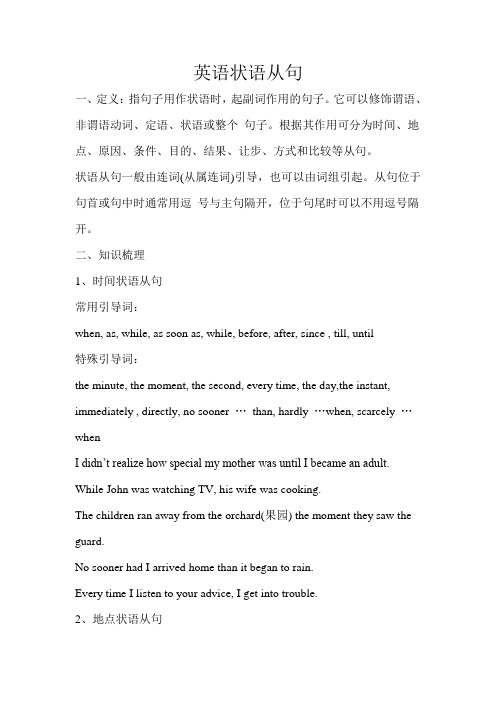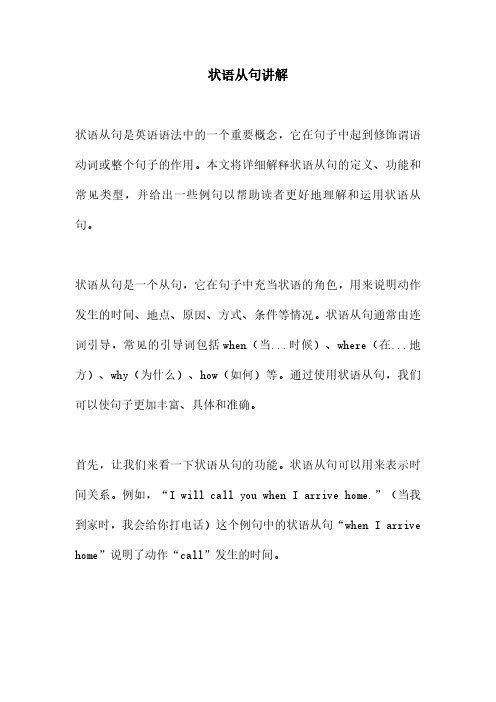英语语法讲解:状语从句
英语语法讲解状语从句

Whatever ( = No matter what ) you say, I'll never change my mind.
八、方式状语从句
方式状语从句常由as, as if (though), the way, rather than 等引导。
You can go swimming on condition that ( = if ) you don't go too far away from the river bank.
If he had come a few minutes earlier, he could have seen her.
e.g. He is disappointed because he didn't get the position.
As it is raining, I will not go out.
Now that you mention it, I do remember.
三、地点状语从句
引导地点状语从句的连词是where 和wherever等。 e.g. Sit wherever you like. Make a mark where you have a question.
一、时间状语从句
表示时间的状语从句可由when, as, while, whenever, after, before, till (until), since, once, as soon as (或the moment ), by the time, no sooner …… than, hardly (scarcely) …… when, every time等引导。
高中英语语法总结之状语从句(共37张ppt)

• Difficulties are nothing if we are not afraid of them.如果我们不怕困难,困难就算不了什 么了。
• We shall go there tomorrow unless it rains. = We shall go there tomorrow if it doesn’t rain. 除非下雨,我们明天就去那里。
• Every time I travelled by boat, I got seasick.我 每次乘船都晕船。
• The moment I heard the song, I felt cheerful. 我一听到这首歌,就感到很愉快。
• Next time you come ,you’ll see him.下次你来 的时候,就会见到他。
• We were not tired though (although) we had worked all day.虽然我们干了一天活,但并 不累。
• (2)even if, even though(even if 和even though的意思为“即使”“纵使”有退一步 设想的意味,多用于书面语中)。
• 5、结果状语从句:
• (1)so that,so…that(so that前有逗号为 结果状语从句,so…that的so后面跟形容词 或副词)。
• We turned up the radio, so that everyone heard the news.我们把收音机的音量放大, 大家都听到了新闻。
• Seeing (that) he was badly ill, we sent for the doctor.鉴于他病情严重,我们派人去请医生 去了。
状语从句语法讲解

咼中英语状语从句定义:在句中作状语的从句是状语从句,修饰主句中的动词、形容词或副词等.状语从句由从属连词引导,从属连词在句中不充当句子成分,只起连接作用,状语从句放在句首时,要用逗号,放在句尾时不用.分类根据意义上的不同,状语从句可分为:①时间状语从句②地点状语从句③原因状语从句④目的状语从句⑤条件状语从句⑥结果状语从句⑦让步状语从句⑧方式状语从句⑨比较状语从句三、时间状语从句主句是一般将来时,时间状语从句用一般现在时表将来;主句是—过去将来时,从句用一般过去时表示过去将来时;主句是一般过去时忆:“主将,从句用一般过去时.记从现”(一)引导时间状语从句的连词有:As,whe n (whe never),before,after,as soo n as,un til (till),since,every time,once. |(二)、具体应用1)“while ”主、从句动作或状态同时发生.用while引导的从句用延续性动词,常表示较长的时间或一个过程.记忆:While 后用进行时.While we were having supper,all the lights went out.Please kee p quiet while others are study in g」While I was writing letters last night,he was watching TV. 2 )When 表示“就在”的时候",while 意为反而,可是,表示转折.One evening Beethoven was walking in a street,when he sudde niy stopped outside a little house.3)When ever无论什么时候,随时1.When ever some one throws in some rubbish,the truck p roduees a pi eee of music. 每当有人扔进一些垃圾时,它(汽车)就放一段音乐2.When ever we' re in trouble,they will help us.3.I go to the theatre, whe never I am free.e and see me whe never you want to.你随时来看我4) till和until(表示"直到” ”)句首多用until |1在肯定句中表示“直到”为止”,主句谓语动词要用延续性动词I was wait ing un til/till he arrived.2、在否定句中表示“直到,,才”主句谓语动词常用终止性动词,这时until和till常被before 替换.I did n' t leave till/un til she came back.5) si nee:主句用完成时,从句用一般过去时,si nee引导的从句间或可用现在完成时It is two years since I have studied En glish.1.We have known each other si nee we were childre n.2.We have bee n friends (ever sin ce) since we met at school.3.It is ”(一段时间)+since+—般过去时态句子It is two years since my sister married. I(一段时间)have/has passed since +—般过去时态句子 Two sisters have/has p assed since my sister married.Si nce+时间点 1.1 have bee n at home since three o' clock this after noon.2. Maria has bee n in Chi na si nee two years ago. | 6) Every time, each time, next time Every time you get back at ni ght, you drop your boots on the floor. Every time I catch cold, I have pain in my back.Next time I go there, I will visit them. | 7) once —旦,就 Once you begin, you must go on. 你一开了头,就应该继续下去 .四、地点状语从句地点状语从句用 where, wherever 引导We should go where the people n eed us.我们应该去人民需要我们的地方 Where there is a will, there is a way. 有志者,事竟成.Wherever they went, they received a worm welcome. 无论他们走到哪儿都受到热烈欢迎 .1 She follow him whose he goes.他无论到哪里她总跟着五、原因状语从句原因状语从句用 because (因为),since (既然),as (由于)引导1、字母由多到少,语气由强到弱.2、由 why 提问必须用 because 回答Since, as 不回答why 的提问,而且从句一般放在句首‘because —般放在主句之后.3、 before of + 名词Because of the rain, we did n' t go to the park.because 禾口 so 不可连用,只能选其一.(另有 although, but ) Why did n' t he come to school? Because he was ill.Si nee I must die, I must. 既然我一定要死,我一定这样做 .Si nee a lot of people make mistakes in life, Mr Smith wan ted to give Joh n a Chance.5、for 并列连词,不能放在句首,主要放在两个并列句之间.For 所提供的理由为一个补充说明而且前面常有逗号隔开The days we short, for it is December now. 目的状语从句用 so (常用于口语),that, so that, in order that 引导目的状语从句的谓语常含有 may, might, can, could, should, would 等情态动词.1. We'll sit n ever to the front so we can hear well.2. He studied hard so that he might succeed.3.门I sp eak slowly so that you can take no tes. |4. They hurried to the stati on in order that they could catch the train.4、 八、目的状语从句5.1 took a taxi so that I could get there earlier. |6. I' m going to the lecture early so that I may get a good seat.七、条件状语从句条件状语从句由if, uni ess, (so) as long as(只需)弓丨导在条件状语从句中要用一般时表示将来时(与时间状语从句相同)We will miss the train if you don' t hurry.He said we would miss the train if we did n't hurry.You will fail the exam uni ess you study hard.=(if you don ' t study hard)He won ‘ t come uni ess he is in vited.=(if he isn't in vited) |Eat less food uni ess you want to become fatter.=(if you don ‘ t want to become better)As long as you are not afraid of difficulties, you are sure to succeed.As long as you don't lose heart, you will succeed.八、结果状语从句结果状语从句由such, that, so, .that, so that, that 引导1.Such, that的常用句型such +a/an +形容词+可数名词单数+that such +形容词+可数名词单数+that+thatSuch+形容词+可数名词复数(不可数名词)注意so many (much, few, little) + 名词,such a lot of (或lots of)+ 名词是惯用法,不可乱用. She is such a beautiful girl that we all like her. |They were such beautiful flower that we bought home.It was such delicious food that they ate it up.2. so+形容词或副词+thatso+形容词+a/an+可数名词单数+thatHe is so rich that he can buy lot of things for himself.He works so hard that he did everyth ing well.It was so hot a day that we all went swim ming.It was such a good day that we all went swim ming.3.S0 that, that都可以引导结果状语从句He did n't study hard, (so) that he failed the exam.4.Too, to, enough, to可以引导结果状语从句与so, that替换,so, that结构可以用too, to替换必须具备两个条件,一是主句和结果状语从句的主语必须一致,二是从句中的谓语部分必须含有can (could) not.She is young that she can’ t go to school.She is too young to go to schoo~|She isn't old eno ugh to go to school.九、让步状语从句although, thougheven though = even if, whether, or however = no matter how whatever = no matter what whoever = no matter who | whe never = no matter whe n wherever = no matter where *although禾口though者E表示"虽然”只是although 更正式,多用于句首,而though 用于句中,二者都可与yet, still连用,但不与but连用Although/Though they are poor, they ofte n help others.They are poor, but they often help others.Although he has failed many times, he does n' t give up trying.Whatever/No matter what you say, I won' t believe you.No matter what you say, I don' t care.No matter who you are, you must obey the rules of our school.However hard he tried, he failed aga in.No matter what the weather is like, you can always find surfers out ridi ng the waves.十、方式状语从句方式状语从句由as如同,按照),as if (though)引导*as和like都有“像”的意思,as是连词,后面连接句子,like是介词后面可加名词、代词或名词性短语.I did the work as others did. 相当于I did like others.You must do as I do.as if(though)两者意义相同,从句谓语动词常用虚拟语气,但实现可能性较大,则用连接词.It seems as if/though it' s going to rain.They are talki ng as if/though they were old frien ds.She treats me as if I were her brother.Whe n you are in home,do as the Roma ns do.Now that everybody has come, let ‘ s begin our conference.The higher in come tax is harmful in that it may discourage people from tryi ng to earn more. Con sideri ng that he is no more tha n 12 years old, his height of 1.80 m is quite remarkable.4.目的状语从句 常用引导词:so that, in order that 特殊引导词:lest, in case, for fearthat,i n the hope that, for the purpose that, to the end that The boss asked the secretary to hurry up with the letters so that he could sig n them.The teacher raised his voice on purpose that the stude nts in the back could hear more clearly.5•结果状语从句特殊弓丨导词: such that, to the degree that, to the exte nt that, to such a degree that, got up soearly that he caught the first bus.It ' s such a good chanee that we must not miss it.To such an degree was he excited that he couldn ‘ t sleep last night.常用引导词:if, un less,例 You must doI told you.A. afterB. beforeC. whereD. as (D) The stude nts must dothe teacher told them.A. asB. beforeC. afterD. if (A)卜一、比较状语从句比较状语从句由 as, as, not as(so) as, than, the+比较级,the+比较级引导He swims as well as you. (do)He does n' t swim as well as you (do). He got here earlier tha n you. (did)The busier he is, the happier he feels.英语语法状语从句类型综述状语从句主要用来修饰主句 或主句的谓语.一般可分为九大类,分别表示时间、地点、原因、目的、结果、条件、让步、 比较和方式.尽管种类较多,但由于状语从句与汉语结构和用法相似 ,所以理解和掌握它并不难.状语从句的关键是要掌握引导不同状语从句的常用连接词和特殊的连接词即考点.现分别列举如下:1.时间状语从句常用弓丨导词: whe n, as, while, as soon as, while, before, after, since , till, un til特殊引导词:the minute, the moment, the second, every time, the day,the instant, immediately , directly,I didn ‘ t realize how special myno sooner ,than, hardly , when, scarcely , whenmother was un til I became an adult.While Joh n was watch ing TV, his wife was cook ing.The children ran away from the orchard(果园)the moment they saw the guard. No sooner had I arrived home tha n it bega n to rain.Every time I liste n to your advice, I get into trouble. 词:where2 •地点状语从句常用引导特殊引导词: wherever, any where, everywhereGen erally, air will be heavilyp olluted where there are factories. |Wherever you go, you should work hard.3.原因状语从句常用弓丨导词: because,since, as, sincecon sideri ng that, i nasmuch as, in somuch as andsuccessful.特殊弓丨导词:seeing that, now that, in that, considering that, given that.My friends dislike me because I ‘ m handsome常用引导词:so , that, so, that, such , thatHe6.条件状语从句特殊弓丨导词:as/so long as, only if, p rovidi ng/p rovided that, suppose that, i n case that, onWe ' ll start our p roject if the p reside nt agrees.7 .让步状语从句 常用引导词:though, although, even if, even though 特殊引导词:as (用在让步状语从句中必须要倒装),while ( 一般用在句首 ),no matter , , in spite of the fact that, while, whatever, whoever,wherever, whe never, however, whichever his prop osal..尽管我很尊敬他,我却不同意他的建议.The old man always enjoys swimmi ng even though the weather is rough. No matter how hard he tried, she could not cha nge her mind. He won ' t listen whatever you may say.&比较状语从句 常用引导词:as (同级比较),than (不同程度的比较)the more , the more , ; just as , , so, ; A is to B what /as X is to Y; no ,more than; not Aso much as BShe is as bad-te mp ered as her mother] The house is three times as big as ours.The more you exercise, the healthier you will be.Food is to men what oil is to machine. 食物之于人,犹如油之于机器.9 .方式状语从句常用弓丨导词: as, as if, how 特殊引导词:the wayWhen in Rome, do as the Roma n do. She behaved as if she were the boss]Sometimes we teach our children the way our parents have taught us. 英语语法状语从句con diti on thatYou will certa inly succeed so long as you kee p on trying.Provided that there is no oppo siti on, we shall hold the meeti ng here.Much as I respect him, I can ' t agree to特殊引导词:。
状语从句英语语法知识点汇总

状语从句英语语法知识点汇总状语从句(Adverbial Clause) 是指句子用作状语时,起副词作用的句子。
状语从句中的从句可以修饰谓语、非谓语动词、定语、状语或整个句子。
下面就是小编给大家带来的状语从句英语语法知识点汇总,希望大家喜欢!1 地点状语从句地点状语从句通常由where, wherever 引导。
Where I live there are plenty of trees.我住的地方树很多。
Wherever I am I will be thinking of you.不管我在哪里我都会想到你。
2 方式状语从句方式状语从句通常由as, (just) as…so…, as if, as though引导。
1) as, (just) as…so…引导的方式状语从句通常位于主句后,但在(just) as…so…结构中位于句首,这时as从句带有比喻的含义,意思是"正如…","就像",多用于正式文体,例如:Always do to the others as you would be done by.你希望人家怎样待你,你就要怎样待人。
As water is to fish, so air is to man.我们离不开空气,犹如鱼儿离不开水。
Just as we sweep our rooms, so we should sweep backward ideas from our minds.正如打扫房屋一样,我们也要扫除我们头脑中落后的东西。
2) as if, as though两者的意义和用法相同,引出的状语从句谓语多用虚拟语气,表示与事实相反,有时也用陈述语气,表示所说情况是事实或实现的可能性较大。
汉译常作"仿佛……似的","好像……似的",例如:They completely ignore these facts as if (as though) they never existed.他们完全忽略了这些事实,就仿佛它不存在似的。
英语语法讲解之状语从句

英语状语从句一、定义:指句子用作状语时,起副词作用的句子。
它可以修饰谓语、非谓语动词、定语、状语或整个句子。
根据其作用可分为时间、地点、原因、条件、目的、结果、让步、方式和比较等从句。
状语从句一般由连词(从属连词)引导,也可以由词组引起。
从句位于句首或句中时通常用逗号与主句隔开,位于句尾时可以不用逗号隔开。
二、知识梳理1、时间状语从句常用引导词:when, as, while, as soon as, while, before, after, since , till, until特殊引导词:the minute, the moment, the second, every time, the day,the instant, immediately , directly, no sooner …than, hardly …when, scarcely …whenI didn’t realize how special my mother was until I became an adult. While John was watching TV, his wife was cooking.The children ran away from the orchard(果园) the moment they saw the guard.No sooner had I arrived home than it began to rain.Every time I listen to your advice, I get into trouble.2、地点状语从句常用引导词:where特殊引导词:wherever, anywhere, everywhereGenerally, air will be heavily polluted where there are factories. Wherever you go, you should work hard.3、原因状语从句常用引导词:because, since, as, for特殊引导词:seeing that, now that, in that, considering that, given that, considering that, as much as, so much asMy friends dislike me because I’m handsome and successful.Now that everybody has come, let’s begin our conference.The higher income tax is harmful in that it may discourage people from trying to earn more.Considering that he is no more than 12 years old, his height of 1.80 m is quite remarkable.4、目的状语从句常用引导词:so that, in order that特殊引导词:lest, in case, for fear that,in the hope that, for the purpose that, to the end thatThe boss asked the secretary to hurry up with the letters so that he could sign them.The teacher raised his voice on purpose that the students in the back could hear more clearly.5、结果状语从句常用引导词:so that, so…that, such …that,特殊引导词:such that, to the degree that, to the extent that, to such a degree that,He got up so early that he caught the first bus.It’s such a good chance that we must not miss it.To such an degree was he excited that he couldn’t sleep last night.6、条件状语从句常用引导词:if, unless,特殊引导词:as/so long as, only if, providing/provided that, suppose that, in case that, on condition thatWe’ll start our project if the president agrees.You will certainly succeed so long as you keep on trying.Provided that there is no opposition, we shall hold the meeting here.7、让步状语从句常用引导词:though, although, even if, even though特殊引导词:as(用在让步状语从句中必须要倒装),while ( 一般用在句首),no matter …, in spite of the fact that, while, whatever, whoever, wherever, whenever, however, whicheverMuch as I respect hi m, I can’t agree to his proposal.尽管我很尊敬他, 我却不同意他的建议。
初中英语语法状语从句课件(共45张PPT)

• 3)than 意为“比……更……”; • The boy is taller_than_his_father. (比他的父
亲还高)
4)比较状语从句通常与倍数表达法结合起来运用。
①A +is…times +as+ adj.原级+as +B ②A +is…times+ adj.比较级+than +B ③A +is…times+ the size/length/height/width/depth +of + B ④The size/length/height/width/depth… +of+ A+ is…times of +B
where引导 A句+where+B句 在B句…地方, A句… 在环境污染严重的地方,许多珍稀物种处于灭 绝的边缘。
Many rare animals are on the verge of extinction where environmental pollution is serious.
三、条件状语从句 1. If引导的条件句 2. Unless 3. Once 4. As long as
• 这个数据在下降到1990年的20%之前,它先上 升到1980年的80%
• Before the figure jumped to 20% in 1990, it increased to 80% in 1980.
• 5. A句+since+B句/时间短语 【自从B句…,A句就…】
自从手机发明以来,人们的生活发生了巨大变化。
五、目的状语从句
A句+in order that+B句 A句+so that+B句 【A句…是为了B句…】
状语及状语从句(语法加练习完整讲解).ppt

4.动词不定式(或不定式短语): He went to see a film .他看电影去了。 My father was surprised to hear the news . 我父亲听到这个消息,感到惊奇。
5.分词(短语): He sat there reading a novel . 他坐在那儿看小说。 The students went away laughing. 学生们笑着走开了。
2023最新整理收集 do something
The Adverbial 状语
ห้องสมุดไป่ตู้ 一、什么是状语
修饰动词、形容词 、副词或整个句子 ,说明 动作或 状态特征的句子成分,叫做 状语。
1. 状语修饰动词 Silently she went away. 她悄悄地走开了。
2. 状语修饰句子 Sadly, he will not be there. 令人伤心的是,他将不会在那里了。
The Adverbial Clauses 状语从句
从状种九
时间状语从句 地点状语从句 原因状语从句 条件状语从句 让步状语从句 结果状语从句 目的状语从句 方式状语从句 比较状语从句
时间状语从句
I will discuss this with you when we meet. 我们见面时再与你讨论这件事。
(2)如果动词前有一个或几个助动词,状语位于第一个 助动词之后。 He has already had his lunch .他已吃过午饭了。
(3)如果动词是 be,状语就放在 be动词之后。 He is always at home. 他总是在家。
3.状语位于句末,这是状语的通常位置。 We get up at six in the morning . 我们早晨六点起床。
状语从句讲解

状语从句讲解状语从句是英语语法中的一个重要概念,它在句子中起到修饰谓语动词或整个句子的作用。
本文将详细解释状语从句的定义、功能和常见类型,并给出一些例句以帮助读者更好地理解和运用状语从句。
状语从句是一个从句,它在句子中充当状语的角色,用来说明动作发生的时间、地点、原因、方式、条件等情况。
状语从句通常由连词引导,常见的引导词包括when(当...时候)、where(在...地方)、why(为什么)、how(如何)等。
通过使用状语从句,我们可以使句子更加丰富、具体和准确。
首先,让我们来看一下状语从句的功能。
状语从句可以用来表示时间关系。
例如,“I will call you when I arrive home.”(当我到家时,我会给你打电话)这个例句中的状语从句“when I arrive home”说明了动作“call”发生的时间。
其次,状语从句可以表示地点关系。
例如,“She looked around to see where the noise was coming from.”(她四处看看,想知道声音是从哪里传来的)这个例句中的状语从句“where the noise was coming from”说明了动作“look around”的地点。
此外,状语从句还可以表示原因、条件和方式等关系。
例如,“He couldn't go to the party because he was sick.”(他因为生病所以不能去参加聚会)这个例句中的状语从句“because he was sick”表示了动作“couldn't go”的原因。
在使用状语从句时,需要注意一些语法规则。
首先,状语从句通常放在主句之前或之后,具体位置取决于需要强调的内容。
其次,状语从句的谓语动词通常使用一般现在时,而不受主句的时态影响。
例如,“I will call you when I arrive home.”(当我到家时,我会给你打电话)中的“arrive”使用的是一般现在时。
- 1、下载文档前请自行甄别文档内容的完整性,平台不提供额外的编辑、内容补充、找答案等附加服务。
- 2、"仅部分预览"的文档,不可在线预览部分如存在完整性等问题,可反馈申请退款(可完整预览的文档不适用该条件!)。
- 3、如文档侵犯您的权益,请联系客服反馈,我们会尽快为您处理(人工客服工作时间:9:00-18:30)。
As it is raining, I will not go out.
Now that you mention it, I do remember.
三、地点状语从句
引导地点状语从句的连词是where 和wherever等。 e.g. Sit wherever you like. Make a mark where you have a question.
一、时间状语从句
表示时间的状语从句可由when, as, while, whenever, after, before, till (until), since, once, as soon as (或the moment ), by the time, no sooner …… than, hardly (scarcely) …… when, every time等引导。
四、目的状语从句
引导目的状语从句最常用的词(组)是so, so that(从句谓语常有情 态动词), in order that, in case(以防,以免)等。
e.g. Speak clearly, so that they may understand you.
She has bought the book in order that she could follow the TV lessons.
e.g. If he is not in the office, he must be out for lunch.
You may borrow the book so long as you keep it clean.
So far as I know(据我所知), he will be away for three months.
七、让步状语从句
让步状语从句可由although, though, as, even if (though), however, whatever, whether …… or, no matter who (when, what, ……) 等引导。注意:as引导的让步状语从句一般是倒装的。
e.g. Though he is a child, he knows a lot.
He was so excited that he could not say a word.
She is such a good teacher that everyone admires her.
六、条件状语从句
条件状语从句分真实性(有可能实现的事情)与非真实性(条件与事实 相反或者在说话者看来不大可能实现的事情)条件句。引导条件状语从 句的词(组)主要有if, unless, so (as) long as, on condition that, so (as) far as, if only ( = if )。注意: 条件从句中的if 不能用whether替换。
He left early in case he should miss the train.
五、结果状语从句
结果状语从句是表示事态结果的从句,通常主句是原因,从句是结果。 由so that(从句谓语一般没有情态动词), so …… that, such …… that等引导。 didn't attend the meeting.
Child as he is, he knows a lot.
Whatever ( = No matter what ) you say, I'll never change my mind.
八、方式状语从句
方式状语从句常由as, as if (though), the way, rather than 等引导。
e.g. When I came into the office, the teachers were having a meeting.
He started as soon as he received the news.
Once you see him, you will never forget him.
e.g. You must do the exercise as I show you.
He acted as if nothing had happened.
九、比较状语从句 比较状语从句常用than, so (as) …… as, the more ……
the more等引导。 e.g. I have made a lot more mistakes than you have. He smokes cigarettes as expensive as he can afford. The busier he is, the happier he feels. 十、使用状语从句时要注意的几个问题 1. 在时间和条件(有时也在方式、让步等)从句中,主句是一般将来时, 从句通常用一般现在时表示将来。 e.g. We'll go outing if it doesn't rain tomorrow. I'll write to you as soon as I get to Shanghai.
状语从句讲解
由从句担任的状语,在句子中可修饰谓语(或其他动词)、形 容词、副词或是整个句子,它可以用来表示时间、地点、原因、目 的、结果、条件、方式、比较、让步等。状语从句是一较大的语法 项目,也是近几年高考题中常见的一个重要试点。高考中已考查了 时间、让步、地点、条件、目的等状语从句,这些从句仍是今后高 考热点,应作充分准备。同时对方式状语从句也应引起重视。
You can go swimming on condition that ( = if ) you don't go too far away from the river bank.
If he had come a few minutes earlier, he could have seen her.
No sooner had I gone to bed than I went to sleep.
二、原因状语从句
原因状语从句是表示原因或理由的,引导这类从句的最常用的连词 是because, since, as , now that(既然)等,for 表示因果关系 时(它引导的不是从句)为并列连词,语气不如because强。
